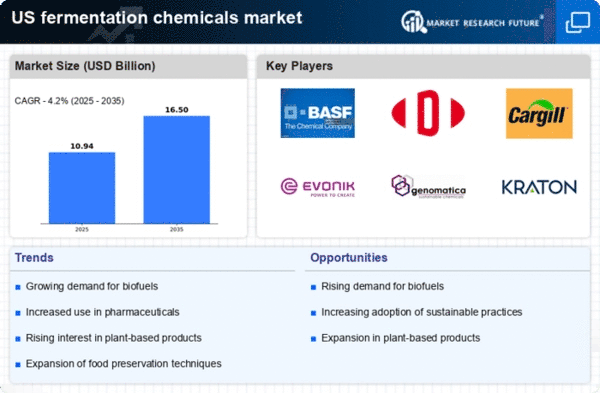The fermentation chemicals market is characterized by a dynamic competitive landscape, driven by increasing demand for bio-based products and sustainable manufacturing processes. Key players such as DuPont de Nemours Inc (US), BASF SE (DE), and Genomatica Inc (US) are strategically positioned to leverage innovation and sustainability in their operations. DuPont de Nemours Inc (US) focuses on developing advanced fermentation technologies to enhance product yields and reduce environmental impact, while BASF SE (DE) emphasizes its commitment to sustainability through the integration of bio-based feedstocks in its chemical production. Genomatica Inc (US) is notable for its pioneering work in developing bio-based alternatives to traditional petrochemicals, which aligns with the growing consumer preference for sustainable products. Collectively, these strategies contribute to a competitive environment that prioritizes innovation and sustainability as key growth drivers.In terms of business tactics, companies are increasingly localizing manufacturing to reduce supply chain vulnerabilities and enhance responsiveness to market demands. The market structure appears moderately fragmented, with several key players exerting significant influence. This fragmentation allows for a diverse range of products and innovations, while also fostering competition among established firms and emerging players alike.
In October DuPont de Nemours Inc (US) announced a partnership with a leading agricultural biotechnology firm to develop new fermentation processes aimed at producing high-value biochemicals from agricultural waste. This collaboration is strategically important as it not only enhances DuPont's product portfolio but also aligns with the broader industry trend towards circular economy practices, potentially reducing waste and improving sustainability.
In September BASF SE (DE) unveiled a new fermentation facility in the Midwest, designed to produce bio-based chemicals at scale. This facility is expected to significantly increase BASF's production capacity and reduce its carbon footprint, reflecting the company's commitment to sustainable manufacturing. The strategic establishment of this facility may position BASF as a leader in the bio-based chemicals sector, catering to the rising demand for environmentally friendly products.
In August Genomatica Inc (US) secured a $50 million investment to accelerate the commercialization of its bio-based butylene glycol production process. This funding is crucial for scaling operations and enhancing the company's competitive edge in the fermentation chemicals market. The investment underscores the growing interest in sustainable chemical production and positions Genomatica to capitalize on the increasing demand for bio-based alternatives.
As of November current competitive trends in the fermentation chemicals market are heavily influenced by digitalization, sustainability, and the integration of artificial intelligence in production processes. Strategic alliances are becoming increasingly vital, as companies seek to enhance their technological capabilities and market reach. The competitive differentiation is likely to evolve from traditional price-based competition towards a focus on innovation, technological advancements, and supply chain reliability, reflecting a broader shift in industry priorities.
















